1. Roles of community service organisation in emergencies
The Victorian Council for Social Services (VCOSS) defines the Roles of Community Service Organisations in Emergencies as follows:
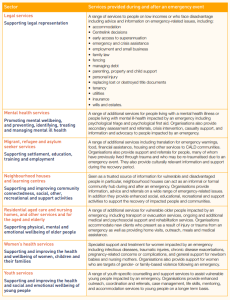
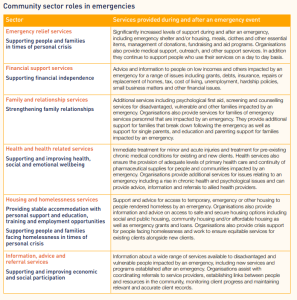
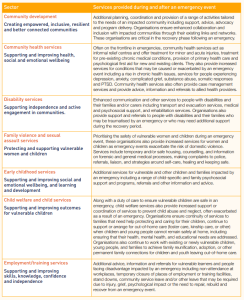
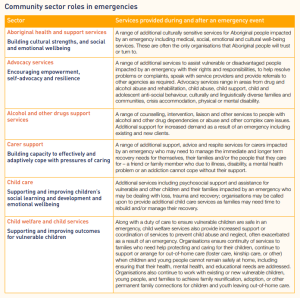
2. Community organisations involvement in disaster managment
The Community Organisation Involvement in Disaster Management prepared by Risk Frontiers, Macquarie University & Bushfire and Natural Hazards CRC describes the role of CSOs as follows:
Community organisations undertake diverse roles, including:
- disaster awareness
- advocacy
- research
- assistance at evacuation centres
- emergency communications
- mental health support
- recovery initiatives
- engagement with communities
- registration of disaster victims
- emergency catering
- dissemination of emergency warnings
- financial counselling
- material aid
- impact assessment
Further key points about community service involvement in disaster management are highlighted as follows:
- Key strengths of community organisations include understanding community needs, local knowledge, focus on vulnerable populations and diverse membership.
- Community organisations play a crucial role in supporting community resilience.
- A whole-of-community approach is essential to integrate community organisations further into disaster management.
- Community organisations represent significant value for investment, contributing significantly to service delivery with limited funding.
- They are critical for community-led disaster recovery initiatives, and achieving community involvement without them would be impossible.
- Unlike some government organisations, community organisations are not hazard-specific but may possess certain specialist capabilities.
- Community organisations collaborate effectively with government, businesses, and each other, both formally and informally.
- Values misalignment or competition among organisations can hinder collaboration.
- Community organisations can act independently, targeting specific needs outside government bureaucracy.
- Government-community arrangements vary across jurisdictions, making it challenging for larger organisations to define consistent roles.
- Despite variations, community organisations generally have a degree of trust in their relationships with government entities.
- People often prefer dealing with community organisations over government due to trust.
- Community organisations are eager to be more involved in disaster management but face resource constraints.
- Barriers to increased involvement include funding issues, lack of role definition, and a government-centric culture in disaster management.
- Lack of funding reduces certainty for community organisations in planning disaster management involvement.
- Community organisations are vulnerable to disruption by disasters, impacting communities, especially the most vulnerable.
- Business resilience is crucial for the availability of community organisations post-disaster, but there are gaps in readiness.
- To enhance involvement, community organisations seek additional funding, funding flexibility, training, greater collaboration, and recognition.
- There are significant opportunities to invest in the capabilities of community organisations to enhance community resilience, especially in severe to catastrophic disasters.
3. Community service organisations role in recovery
The NSW Government Get Ready for Disaster describes Community Service Organisations Role in Recovery as follows:
Following an emergency, contact your local council for information about how community recovery is coordinated. Your organisation will have an important role in the following:
- Connect with the people and community you are working with
- Understand their needs
- Provide information and support
- Link them with services
- Share knowledge with other organisations
- Help inform recovery activities and services
4. Planning and preparing for community-led disaster recovery
The guide “Planning and Preparing for Community-Led Disaster Recovery: A Guide for Local Organisations” outlines the roles of CSOs during and after disaster as follows:
- Referring: Guide people needing assistance to the right services.
- Connecting: Help disaster relief organisations reach local people, especially the vulnerable or those you already work with.
- Communicating with Specific Groups: Reach out to at-risk or vulnerable people who may not engage with mainstream disaster communications.
- Gathering Information and Assessing Needs: Report on the situation and assess the disaster’s impact and community needs.
- Advocating: Speak up for the needs of specific groups, animals, or environmental health.
- Networking: Connect and facilitate communication between different disaster recovery organisations.
- Coordinating: Organise disaster recovery activities, including the distribution of support and funding.
- Helping Apply for Support: Assist people in applying for aid, including filling out forms and translating language.
- Distributing Information: Provide information about available support, meeting places, evacuation centres, and road closures.
- Meeting/Gathering Place: Offer a space for community members to meet.
- Psychosocial Support: Help people with daily tasks, social connections, and accessing various supports.
- Mental Health Support: Provide formal mental health services, such as counselling and crisis support.
- Education: Offer education, training, and skills-building programs.
- Food Preparation: Prepare meals for distribution.
- Food and Water Distribution: Distribute food and water, including pantry services and pre-prepared meals.
- Accommodation: Help people find or provide accommodation.
- Distributing Goods or Financial Assistance: Source and distribute goods and financial aid like clothing and disaster assistance grants.
- Providing Volunteers: Supply volunteers for rebuilding activities.
- Wildlife Care or Animal Welfare: Support wildlife and animals in your area.
- Natural Resource Management: Engage in activities to restore environmental health.
5. Reflective questions
Based on the above resources, we have developed a set of reflective questions for CSOs to consider when engaging in Climate Justice and Resilience Work. Those can be used in team workshops and project development.
Preparing for disasters
- How well do our current plans address the needs of the most vulnerable people in our community?
- What steps have we taken to make sure we can keep operating during a disaster?
- Are our staff and volunteers properly trained to handle emergencies and support people in need?
CSO roles
- Which roles listed (like disaster awareness or mental health support) are we most prepared to handle, and which ones need more work?
- How do we currently support advocacy and research on disaster management, and what can we do better?
- How can we improve our emergency communications and the way we share warnings with the community?
Engaging with the community
- How can we better connect with local people to improve our disaster response and recovery efforts?
- What methods do we use to register disaster victims and assess their needs, and how can we make these processes more effective?
- How well do we work with other organisations, government bodies, and businesses during and after disasters?
Managing resources
- What are our main resource challenges, and how do they affect our ability to be involved in disaster management?
- How can we manage our resources better to ensure we can continue to provide services during and after a disaster?
- Are there ways to get more funding or support to improve our disaster preparedness and response?
Training and development
- What extra training or skills do our staff and volunteers need to do their jobs better during a disaster?
- How can we make sure our training is up-to-date with the latest practices and strategies?
Supporting recovery
- How do we currently help people recover from disasters, and what can we do to better link them with the services they need?
- How can we improve our role in recovery activities to make sure they are effective and inclusive?
- How can we share what we’ve learned from past disasters to improve future recovery efforts?
Working with others
- How can we work better with other community organisations to create a more coordinated disaster response?
- What obstacles might we face in working together, and how can we overcome them?
- How can we make sure our values align with those of our partners to improve our disaster management efforts?
Building trust and communication
- How can we build and keep trust with our community and government partners to make disaster response and recovery smoother?
- What communication strategies should we use to ensure our messages are clear and timely during emergencies?
Read more
The key role of community organisations in disaster recovery
Toolkit 2-1 Community recovery checklist – Australian Institute for Disaster Resilience
Disaster & Climate Resilience – QLD Community Legal Centres
